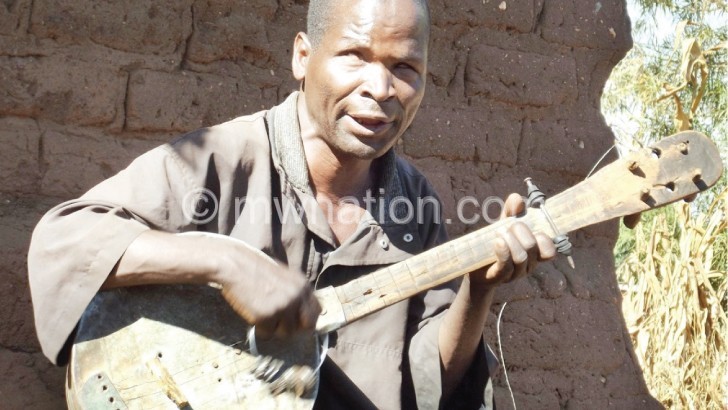Widowed by unsafe abortion
Time heals, so they say. But Humphrey Zembeni, 46, is still hurt almost four years since his wife died of complications of unsafe abortion.
“Time has failed to heal the wound created by my wife’s departure,” says the man who raises five children single-handedly.
Zembeni lost sight to measles when he was two years old.
In his Kamwana Village in Lilongwe, he fondly remembered his wife Eveless Mwafei Binson, who was partially blind.
Together they raised their children using meagre handouts accruing from roadside music performances in the capital city-with Zembeni playing an improvised guitar and his wife banging a tin drum.
Now, he sings alone-with the children collecting the proceeds.
The music sessions on the streets have ceased being musical since death robbed him of his “beloved drummer, wife and mother” on May 10, 2013, he says.
“We were not ready for a sixth child,” he recalls. “But we suddenly realised that my wife was pregnant although she was on contraceptives. We agreed to keep the pregnancy, but behind my back, someone convinced her to get rid of the pregnancy.”
Change of heart
The woman consulted someone in Nathenje who terminated the pregnancy on May 9 2013.
“We were going to town for the usual performance when my wife changed the route. I quizzed her, but she said it was just a short cut to the city,” he recounts.
The road took them to the home of the traditional abortionist who told Zembeni to sit on the veranda as his wife ventured into the grass-thatched hut.
He narrates: “I was puzzled. I kept shouting: ‘What are you doing with my wife in there?’ When she reappeared after an hour, she told me the pregnancy was gone. She asked me to take her home because the pain was unbearable.
“I was furious because I did not know what she was up to. I was afraid of the consequences. True to my fears, her condition worsened. We rushed her to Bwaila Hospital, but they referred her to Kamuzu Central Hospital where she succumbed to severe loss of blood the following day. Doctors say she had punctured her womb and other internal organs.”
A health worker at Bwaila tells Malawi News Agency that they found a cassava stick in her uterus.
“Her condition was very hopeless when she arrived here,” the source says.
This highlights the plight of thousands of women who suffer life-or-death complications of backstreet abortions as the country’s strict laws only allow termination of pregnancy when it threatens the life of the woman.

According to the Ministry of Health, almost 70 000 women and girls terminate pregnancies every year and nearly 31 000 of them are treated for life- complication that often result in deaths, disabilities and barrenness.
Nearly 20 000 admissions and 17 percent of pregnancy-related deaths in the country are attributable to unsafe abortions.
Mzuzu Central Hospital director Dr Frank Sinyiza says the burden of clandestine abortions is higher as many cases go unreported.
At Nsanje District Hospital, health workers are concerned with growing demand for post-abortion care and treatment.
Most women and girls are losing their uteruses due to severe damage. According to Nsanje District health officer Dominic Mnyontho, the hospital treats up to 11 cases of abortion-related complications every month.
The patients include schoolgirls as young as 15 years old.
“Cases of ruptured uteruses are not uncommon. Women and girls use dangerous methods to terminate pregnancies. When the uterus becomes septic, we cannot retain them,” explains Mnyontho.
Law reform
Legislators visited Mwanza, Blantyre, Mangochi, Zomba, Karonga, Mzimba, Dedza, and Mchinji district hospitals in November 2016. They were horrified by the costs of unsafe abortion on the country’s healthcare system as they wait to debate over proposed amendments of abortion laws.
According to Lilongwe district health officer Dr Mwai Mwale, Bwaila Hospital alone receives almost 800 abortion cases a month.
Behind the women and girls at risk of crippling effects of unsafe abortion is a tug of war on whether to relax the law in line with the draft Termination of Pregnancy Bill.
The proposed law was developed by the Special Law Commission on the Review of Abortion Laws following wide consultations between 2012 and 2015.
Coalition for the Prevention of Unsafe Abortion (Copua) wants lawmakers to scrape sections 149, 150, 151 and 243 of the Penal Code which the network described as vague and restrictive.
More grounds for change
Chief Lukwa of Kasungu backs calls for more grounds for women wishing to terminate pregnancies safely and legally.
“Women and girls are dying because legally they cannot procure safe abortions. As a result they resort to using sharp objects, hazardous herbs and toxic substances. We need to do something about this,” says the traditional leader.
Concurring, Inkosi Mabulabo of Mzimba says present laws punish and marginalise the rural poor.
“The well-off in urban areas actually access safe abortions in both private and public hospitals,” the Ngoni chief.
The Reverend Cliff Nyekanyeka of the CCAP Synod of Blantyre urges against hypocrisy, calling for a sober approach to the on-going law reform.
And Zembeni has a word for the nation.
As his fingers freeze on the thin-wire strings, the grief-stricken man stammered: “If the law offered women choices, my wife would have been attended to by a skilled health worker and at a certified health facility. She would have been alive, singing with me to feed our children.”





